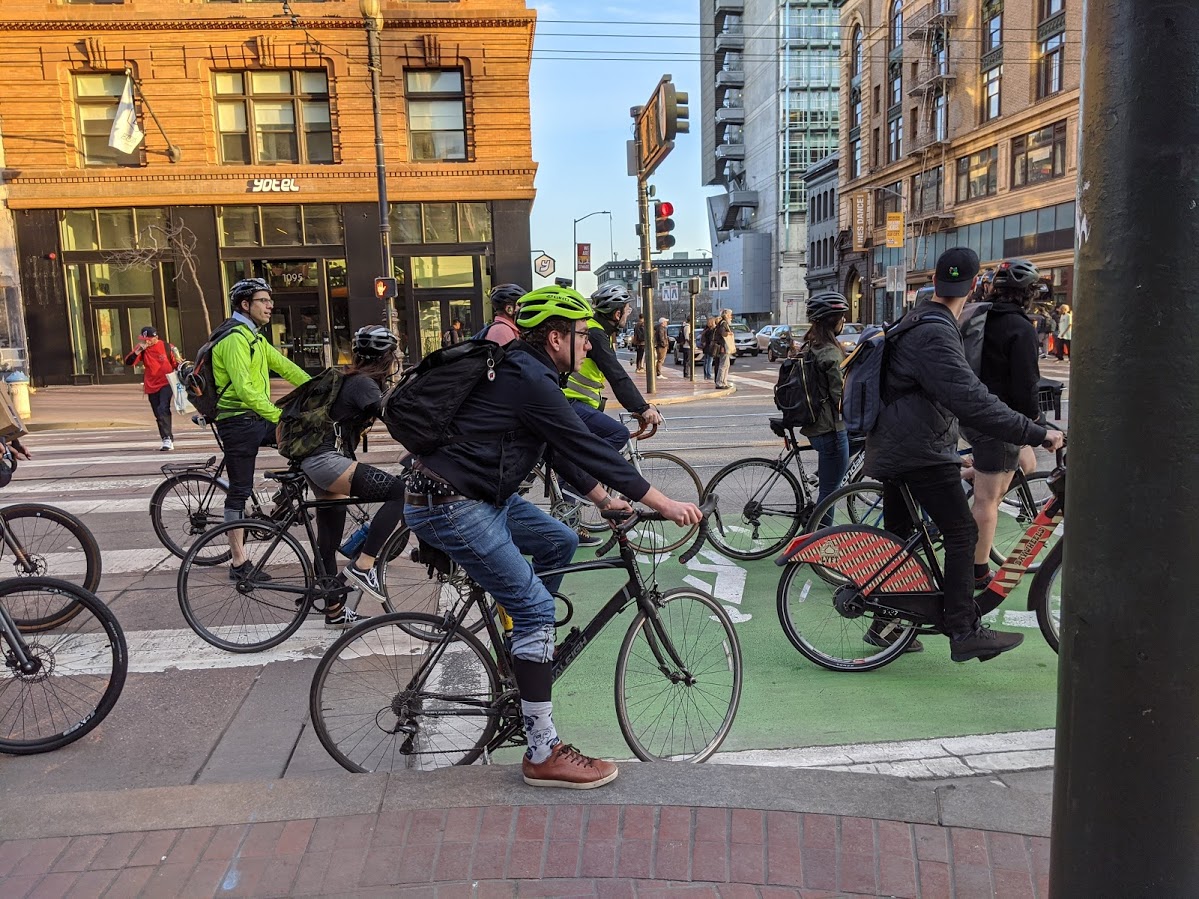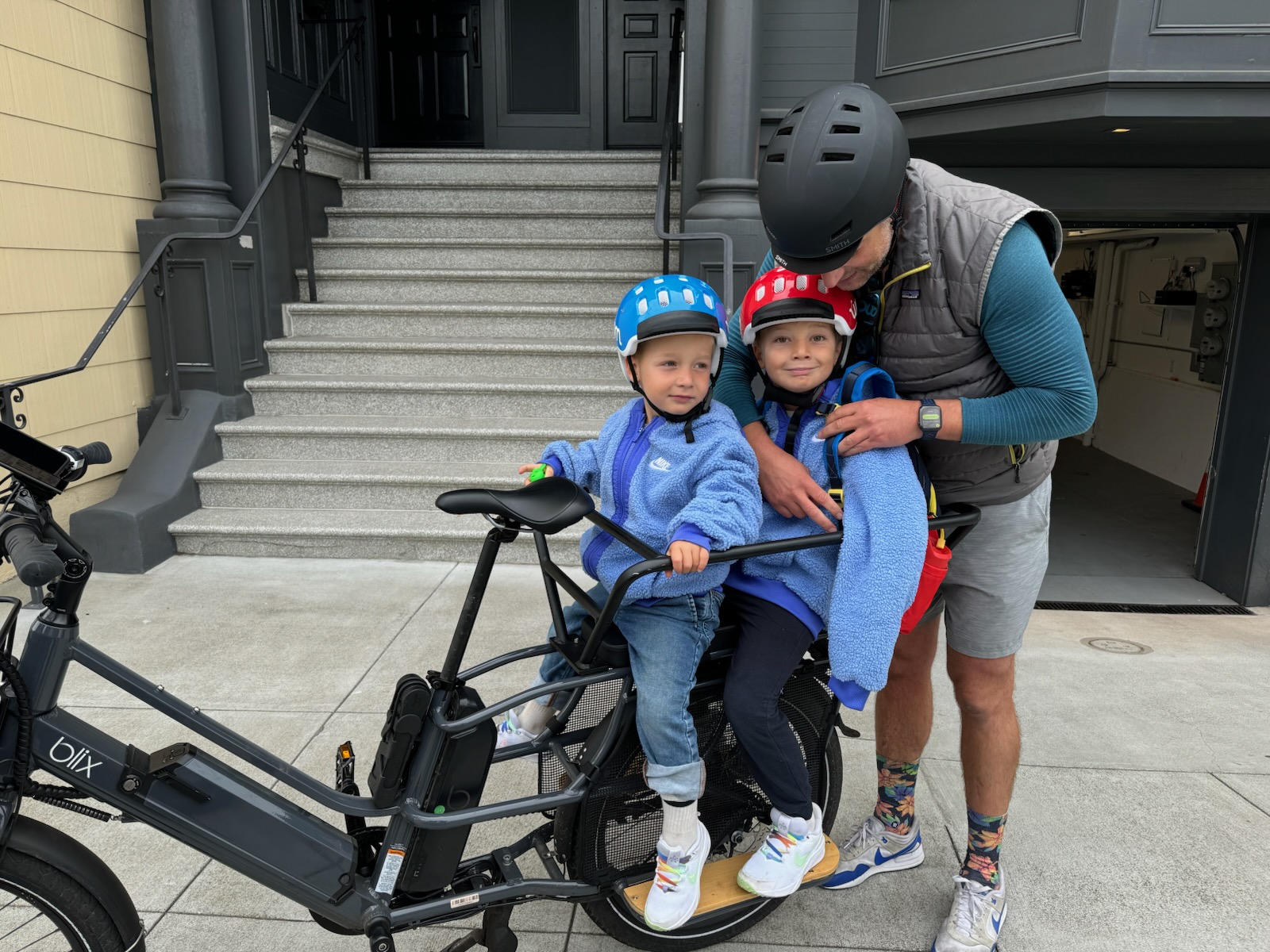Note: GJEL Accident Attorneys regularly sponsors coverage on Streetsblog San Francisco and Streetsblog California. Unless noted in the story, GJEL Accident Attorneys is not consulted for the content or editorial direction of the sponsored content.
Governor Gavin Newsom signed SB 288, which will exempt many bike and transit projects from lengthy environmental reviews, into law on Monday.
The California Environmental Quality Act, or CEQA, became law in 1970. It requires various steps of outreach and mitigation for construction projects. The idea was to protect people from the environmental damage caused by construction pollution, dirt, noise etc. However, since then it's been routinely twisted and used not to protect people or the environment--but to jam up safety projects that would sacrifice parking or reduce motor-vehicle lanes. One of the craziest examples of this came in 2006, when Rob Anderson sued under CEQA to stop San Francisco from striping bike lanes and building out its bike network. The suit was tossed out. But for the four years it was pending, San Francisco couldn’t even install a bike rack.
Back in June, Senator Scott Wiener introduced SB 288 to exempt bike and transit projects built on existing streets or rights-of-way from CEQA review. It will now be possible to install bike lanes, transit-only lanes, and 'slow streets' at a much faster pace.
.@GavinNewsom just signed my legislation, #SB288, to streamline/accelerate approval of sustainable transp projects, eg, light rail, bus lanes, bike & pedestrian projects.
— Senator Scott Wiener (@Scott_Wiener) September 28, 2020
It covers projects like Slow Streets.
Big win in the fight against climate change & for economic recovery.
Bay Area advocates were ecstatic. Here's a list of their reactions.
Cat Carter, San Francisco Transit Riders:
We thank Scott Wiener for his hard work and leadership to get SB 288 passed. It's counter-intuitive that projects that help people get out of their cars, travel more sustainably, make our streets safer, and make it possible to address climate change have been held up for years, with extra costs piled on, to see if they somehow might negatively impact the environment.
We've seen time and again that when you make public transit more efficient and easier to use, more people use it and more people leave their cars behind. Low cost, common-sense solutions exist but projects can lag due to "environmental review." These delays have real world impacts on the hundreds of thousands of transit riders who get left behind.
Especially now, when the future of public transit hangs in the balance and we need a strong and sustainable recovery from this crisis, SB 288 is so important for making public transit more efficient in terms of service and in terms of cost, and sooner
Nick Josefowitz, SPUR:
It makes no sense to have bike lanes, bus lanes and pedestrian safety infrastructure caught up in years of costly environmental lawsuits. SB288 fixes that. This bill will be critical to deliver the desperately needed transit and bike/ped infrastructure up and down the state
Dave Campbell, Advocacy Director, Bike East Bay:
This is terrific for speeding up transit, in many ways, and has Bike East Bay's full support. In fact, we met last week with AC Transit staff to discuss how Bike East Bay and AC Transit can collaborate more to improve mobility and substantially improve safety. We are looking forward to working with local cities and partner to advance this work
Ian Griffiths, Seamless Bay Area:
Not a lot to say here, other than 'yay!' But, in an attempt to be slightly more articulate...Clearly, bus lanes and bike lanes are good for the environment, not bad. We're thrilled that this law will help such projects get built more quickly so they don't get delayed due to assessment of environmental impacts. If we want to transform our transit into a seamless, high ridership system, building out better bus networks much more quickly than in the past is essential. The AC Transit BRT 20-year saga is something we don't want to repeat. Bus priority projects should be able to be implemented in a matter of months, not years -- let alone decades
Darrell Owens, East Bay Transit Riders Union:
I'm ecstatic. CEQA was being used to advocate on behalf of automobile and fossil fuel interests. For example, AC transit doesn't want to expand bus-only lanes into Berkeley and San Leandro because they worry about getting hit by CEQA lawsuits by motorists and businesses that support only parking. At least now public transit can advance without the fear of drivers and business interests attacking public transit with baseless environmental lawsuits against low and zero emission transit, in an attempt to preserve polluter cars. I'd imagine public transit agencies are probably pretty happy right now too.
The San Francisco Bicycle Coalition's Brian Wiedenmeier, meanwhile, cautioned that determined gadflies will continue to try and use the courts to jam up projects, especially locally:
We're excited to see reforms to CEQA and transit projects occur at the state level thanks to SB 288, and we hope it adds momentum to the CEQA appeal reform we are working on here in San Francisco. There needs to be a higher bar so that individual serial appellants cannot continue to delay needed infrastructure in our city.
But with SB 288 to become the law of the land next year, there should be fewer opportunities for those individuals to delay necessary projects.
For more on SB 288 and CEQA reform (including some alternate viewpoints) check out coverage in Streetsblog California.
Note: Streetsblog S.F. will be on partial hiatus Wed., Sept. 30, Thurs. Oct., 1, and Friday, Oct. 2. Headlines, syndication and light publishing will continue thanks to the assistance of editors who cover events in LA, statewide, and in other cities in the Streetsblog empire.





